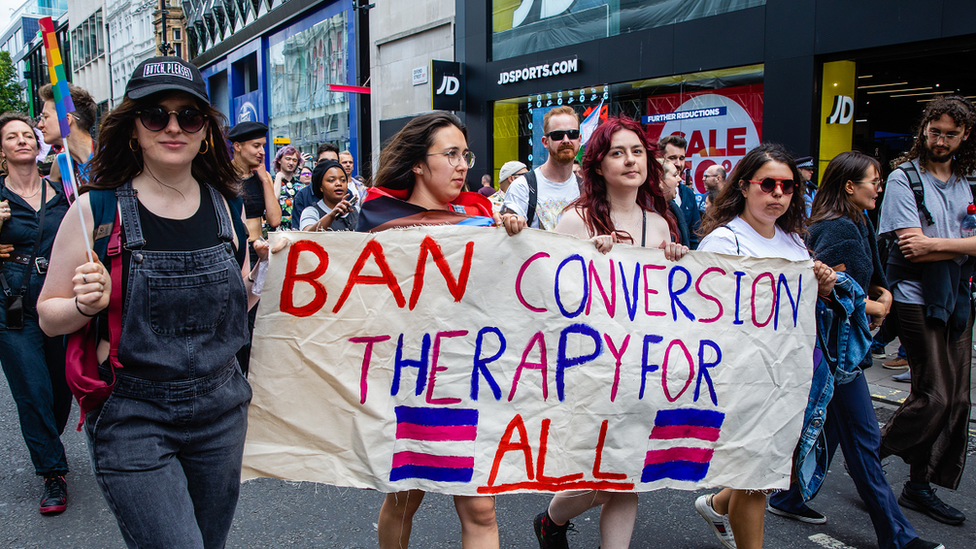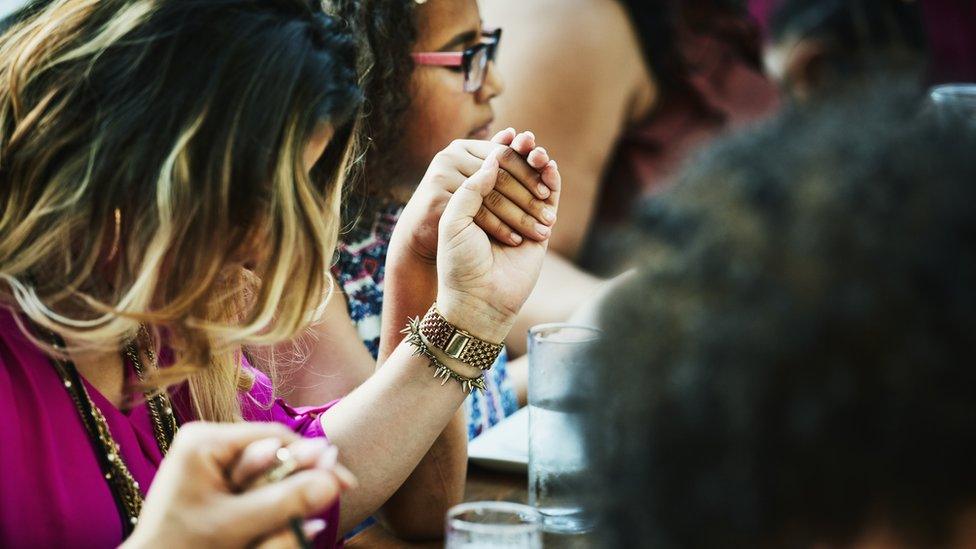What is conversion therapy and when will it be banned?
- Published

Plans to outlaw so-called conversion therapy in England and Wales have been announced in The King's Speech.
The Labour government wants to ban what it calls "abusive" practices intended to change people's sexual orientation or their gender identity.
What is conversion therapy?
According to the British Psychological Society (BPS), conversion therapy - sometimes called "reparative therapy" or "gay cure therapy" - tries to change someone's sexual orientation or gender identity.
In practice, it means trying to stop or suppress someone from being gay, or from identifying as a different gender to their sex recorded at birth.
It can include talking therapies and prayer, but more extreme forms can include exorcism, physical violence and food deprivation.
The BPS and other professional bodies, including NHS England and the Royal College of Psychiatrists, have warned that all types of conversion therapy are "unethical and potentially harmful". , external
Justin Beck: 'Conversion therapy left me emotionally traumatised'
What is the government doing about conversion therapy?
The new Labour government has said it will introduce a Conversion Practices Bill, to ban practices aimed at changing or suppressing someone's gender identity or sexual orientation in England and Wales.
It says the bill will not stop professionals offering support to those exploring their sexual orientation or gender identity, or those providing medical care and support.
Once a draft bill is published, it will undergo consultation before a full bill is formally introduced to Parliament.
Why weren't trans people covered by previous plans to ban conversion therapy?
The previous Conservative government had also worked to introduce a ban, but said banning conversion therapy practices related to gender identity was complex, and required further consideration.
It warned of "unintended consequences", which might affect teachers, parents and therapists helping children who are struggling with their gender identity.
An NHS-commissioned report, external which called for a rethink of children's gender identity services in England said that some healthcare professionals already felt under pressure to "take a purely affirmative approach" to young people who said they wanted to transition.
However, a number of medical practitioners said a ban which still allowed for explorative therapies was possible, and had already been enacted in other countries.
The BPS' Dr Adam Jowett said: "Clinicians can still help people fully explore their gender identity where appropriate, but it's time for this unacceptable and harmful practice to end."
How common is conversion therapy in the UK?
It's difficult to know exactly how widespread the practice is. There is no standard legal definition and victims may be reluctant to share their experiences.
About 5% of the 108,000 people who responded to the government's UK-wide LGBT Survey in 2018, external said they had been offered some form of conversion therapy, while 2% had undergone it.
Those from an ethnic minority background were more likely to be affected, as were people with religious faith.
About 10% of Christian respondents and 20% of Muslims said they had undergone or been offered conversion therapy, compared to 6% of those with no religion.
More than half of those who had received the therapy said it had been conducted by a faith group, while a fifth received it from healthcare professionals.
A higher proportion of transgender respondents had experience of the practice. Almost one in 10 trans men said they had been offered conversion therapy, while one in 25 said they had undergone it.
But the survey did not define what it meant by conversion therapy, and did not ask when or where it had happened.
What do religious groups say about a ban?
Some religious groups oppose any ban on conversion therapy, and warn that it would infringe on traditional religious teachings, including the belief that sex outside a heterosexual marriage is sinful.
The Evangelical Alliance, which says it represents 3,500 churches, argues a ban could jeopardise religious freedoms, external.
However, the Church of England says the practice has "no place in the modern world".

What is happening elsewhere in the UK?
In Northern Ireland, politicians passed a non-binding motion in April 2021 calling for a ban, and work is continuing on a policy to end conversion practices.
The Welsh government is seeking legal advice on whether it can bring in its own ban.
In Scotland, a government consultation into a ban closed in April 2024, external, and the findings are now being considered.
Have other countries banned conversion therapy?
Approximately 16 countries have introduced a full or partial ban, including Brazil, Canada and Germany.
About 20 US states have banned the practice for minors, although many of these do not include religious counsellors and organisations.
Some other countries, including Ireland, have proposed bans or are consulting on the issue.
Update 20 September 2024: We added some additional text to the article to clarify that although a Conversion Practices Bill had been signalled in the King's Speech a draft bill had not at that stage been published, as we originally reported.